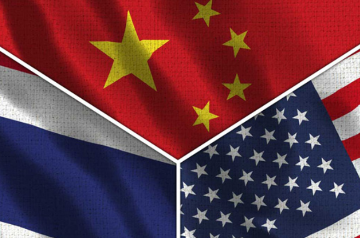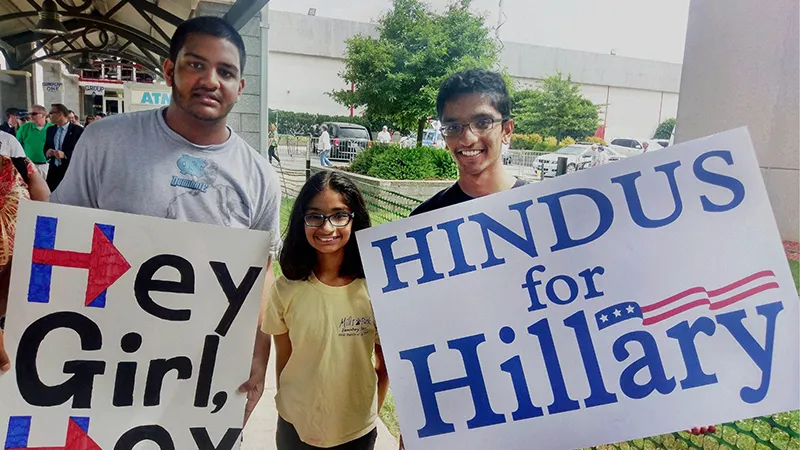
After starting with a total of at least twenty candidates, the United States presidential race, in terms of the major parties, has finally come down to two. With the onset of the Republican and Democratic Conventions this month, the nominees of the two parties in this long-drawn-out election are confirmed: Hillary Clinton and Donald Trump. As 2016 American politics transitions from the primary to the general, it is a pertinent time to examine not only the current stated policies of Clinton and Trump, but also how they have changed and continue to change over the course of the election cycle. With that in mind, here is a comparative analysis of these political positions, starting with the positions given by political surveying website isidewith.com.
See: Official positions — ISideWith
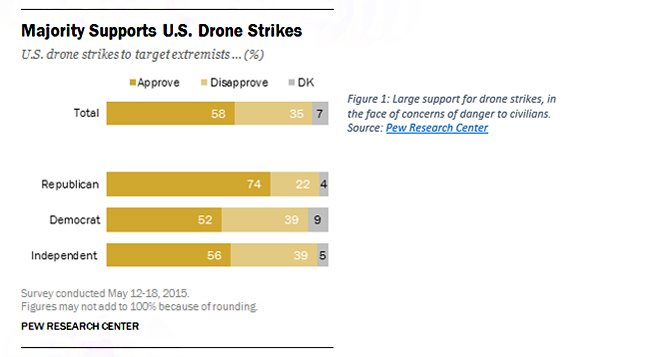
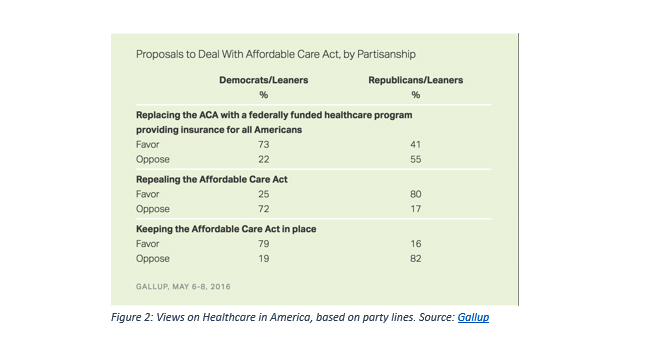
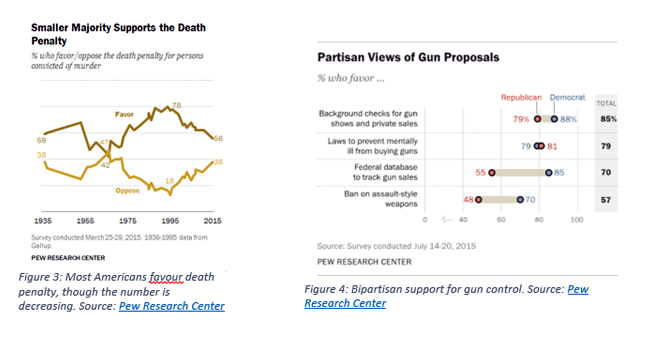
Some possible contradictions to the “official” positions:
Trans-Pacific Partnership
Perhaps one of the biggest and most contentious political topics debated by all the candidates throughout this election cycle is the Trans-Pacific Partnership trade deal. Having been in the works for several years, the TPP, with its details and specifics, was
released to the public by the US in November 2015. According to the
US Trade Representative, the TPP aims to “promote economic growth; support the creation and retention of jobs; enhance innovation, productivity and competitiveness; raise living standards; reduce poverty and promote transparency, good governance, and enhanced labour and environmental protections.”
While President Obama has considered it to be "highest standard trade agreement in history", the trade deal has received
a great deal of criticism not only from various political activists groups, but also from politicians like presidential candidate Bernie Sanders and Massachusetts Senator Elizabeth Warren. Many of the critics have argued on the basis of protectionism, the effects on health and the environment, and especially against the possible enforcement of investor-state dispute settlement (ISDS), which gives corporations the power to put pressure on member countries, to change existing laws.
In the context of the 2016 election, both the remaining candidates oppose the TPP, as stated above. Following Bernie Sanders’ endorsement of Hillary Clinton recently, Donald Trump, in a near-unprecedented move for a Republican presidential candidate,
went so far as to appeal to Bernie Sanders supporters to vote for him instead of Hillary Clinton on the issue of TPP.
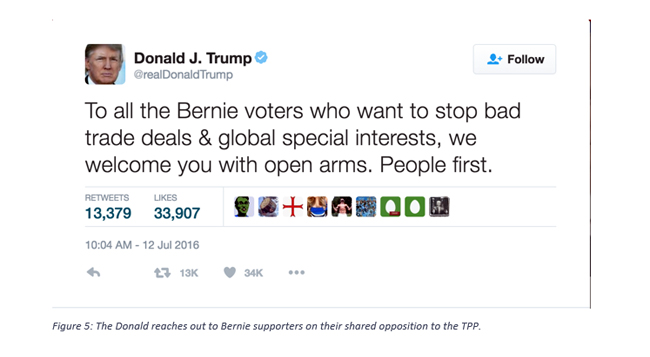
This is perhaps one of the issues in which Trump has been able to hit Clinton hard, despite her official opposition to the trade deal. What certainly helps Trump’s case is that despite Clinton stating that she is against the TPP,
it is well-documented that she has pushed for the TPP at least 45 times, before
opposing it long after Sanders began his presidential campaign. On the other hand, while Trump has shown himself to be a passionate opponent of the TPP and
pledging to punish companies for outsourcing ,
his own benefits from outsourcing suggest some hypocrisy on his part. Additionally, the possibility of Trump pandering to a sentiment of populist anger in the US, as a result of the rise of Sanders, may be a reasonable point to consider.
Super PACs and campaign donations
Another key issue which has been a
source of discontent among the American people is the issue of money in politics and campaign finance reform, although it is arguably an issue that only became more mainstream due to the
short-lived presidential bid of Harvard Law professor Lawrence Lessig. Lessig had initially launched his campaign on the
single issue of campaign finance reform by passing what he referred to as
the Citizens Equality Act of 2017. As his campaign gained traction despite his exclusion from the Democratic debates, other candidates, like
Bernie Sanders, who did not have a Super PAC, appeared to give the issue of campaign finance and Citizens United more attention than they had previously in speeches and debates.
The two remaining candidates also have expressed opposition to the influence of money in politics in various ways. While Clinton claimed to support Sanders’ position on overturning Citizens United at the
Democratic debate in Flint, Trump has harshly criticised his opponents for taking donations through Super PACs and claimed to have been
self-funding his campaign. However, for both of them, possibilities of contradictions arise. In Clinton’s case, there have been numerous allegations of her being corrupt or bought by her biggest donors, whether it is based on
money raised for the State Department,
paid speeches for Goldman Sachs or
simply the existence of her Super PAC. When it comes to Trump, his claims of self-funding his campaign may be seen as misleading, since
he reportedly attempted similar kind of fundraising he later criticised other candidates for.

Donald Trump on healthcare
Perhaps one of Trump’s most confusing stances to try and pin down is his stance on healthcare, namely on the role played by the government in healthcare. While his opposition to Obamacare may not necessarily come as a surprise, given
the number of times Republican politicians in Congress have tried to repeal Obamacare, his pledge, in some debates, of “something so much better” than Obamacare comes across as a version of single-payer healthcare that has been promoted by candidates like Bernie Sanders. Thus, it is difficult to say here whether this is an attempt to move to the left, especially whether he will continue to push for what he considers superior to Obamacare now that Sanders has encouraged his supporters to vote for Clinton in the general election.
https://www.youtube.com/watch?v=1QlM0hl-cT8
Donald Trump on the federal minimum wage
The difficulty in obtaining a certain position on Donald Trump’s policies continues when it comes to the issue of increasing the federal minimum wage. Although he and Clinton both currently appear to agree on raising the minimum wage, there is evidence of this being a
flip-flop on Donald Trump’s part, following him facing
criticism from Sanders for his initial opposition to raising the wage.
Donald Trump on the banning of Muslim immigrants
This issue first came to the fore in the aftermath of the Paris terrorist attacks in November 2015, as
Trump called for a ban on all Muslims from entering the United States until, as the campaign press release stated, “our country’s representatives can figure out what is going on.” He continued to double down in his support for such a ban until June 2016, when he appeared to change his position, as
his spokeswoman stated, he only wanted to ban those Muslims coming from terror states.
Hillary Clinton on fracking
A key topic of difference between Hillary Clinton and Donald Trump is on environmental issues. As stated in the table, Trump and Clinton claim to disagree not only on whether climate change is a man made issue that needs regulations, but also on fracking, which is a process of obtaining natural gas by drilling down into the earth. While Clinton has expressed in Democratic debates with Sanders that she opposes fracking due to certain environmental effects,
she has allegedly promoted it in the past before running for President.
https://www.youtube.com/watch?v=ExyTZGWJamA
Hillary Clinton on same-sex marriage
It was a historic moment for the history of the United States on June 26, 2015, when same-sex marriage was legalised nationwide after a Supreme Court ruling. Hillary Clinton has officially stated her support for the legalisation of same-sex marriage, but a closer examination of her views on this social issue reveals that her first expression of support was as recent as 2013, a time when
majority of Americans were already in favour of same-sex marriage. This could possibly be seen as a decision made largely on political expediency, given the
history of her views on LGBT rights, although Clinton and her campaign have maintained that her views on this issue evolved.
Running mates’ positions vs. candidates’ positions
Mike Pence
Announced as the Republican nominee for Vice President by Trump on July 15, 2016, Indiana Governor Mike Pence perhaps differs most from Trump in terms of political experience. While Trump has never held political office on any level in the US, Pence has been directly involved in politics since 2001 when he became a member of the House of Representatives.
Interestingly, Pence’s recent and past views on some of the issues also diverge from Trump’s “official” stances. For instance, in December 2015, he referred to banning Muslims from entering the US as
“offensive and unconstitutional”, thus taking the opposite position of the Trump campaign on this issue. Another major difference between the Republican nominee and his running mate is on the issue of free trade. Not only did Pence
vote in favour of a number of free trade agreements during his 12-year tenure in US Congress, but he has also
recently supported the TPP, a deal that Trump has strongly stated his dislike for, as stated above.
While
the rest of his voting record in the House indicates some consistency with most of Trump’s stances, these two areas of disagreement could represent a major hurdle for the Republican ticket, especially during the debates.
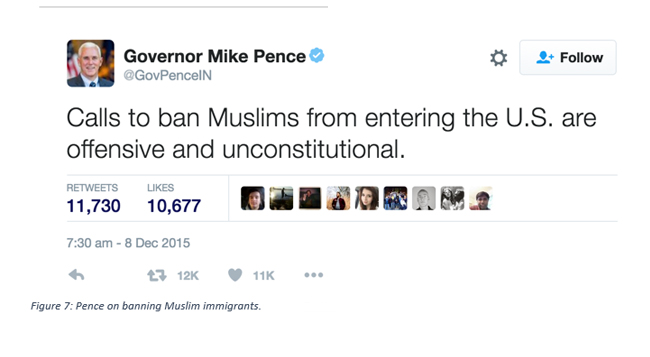
Tim Kaine
Compared to his Republican counterpart, Virginia Senator Tim Kaine largely appears to have
opinions and a
voting record more in line with the stances of his party’s Presidential nominee. However, in Kaine’s case as well, there are areas that could become hurdles for the Democratic ticket. For instance, just like with the Republican side, there may be contradictions between Clinton’s stance and
Kaine’s own views on the TPP, though he has,
even more recently, opposed it.
Implications for India and India-US relations
In the midst of this long election, there has been relatively little said by either candidate with regards to India or on the topic of Indo-US relations.
In Trump’s case, he considers India to be
“doing great” and has attempted to expand his brand to the country, although he courted controversy by
appearing to imitate an Indian call centre during one of his speeches. His praise for the country has perhaps been reciprocated by support from Hindu nationalists,
who rallied for him in Delhi in May 2016.
Going by some of Trump’s statements on India’s neighbours
Pakistan and
China, and
his views on some aspects of US foreign policy, it is a possibility that a Trump presidency would offer greater support to India, especially in situations like tensions between India and China or India and Pakistan. Additionally, Trump’s
view on global warming and the Environmental Protection Agency could mean that some of the pledges made during the
recent India-US joint climate statement will be rescinded by the US, should Trump become the President.
As for Clinton, a statement on India-US relations came not from her, but rather from her campaign committee chairman, who claimed that Clinton, if elected President, would
“follow” the “tradition” of previous Presidents in strengthening relations between the United States and India.
A Clinton presidency appears to indicate that relationship between US and India, as well as the US and India’s neighbours, would remain in a similar form as they have been under President Obama. One could expect more progress on the issue of curbing climate change, like encouraging “greater investment in India’s renewable energy sector”, as mentioned in the joint statement. So, a Clinton-led government will perhaps put more pressure on the Indian government to move away from traditional energy sources than Trump would, although Clinton has promoted policies with environmentally questionable aspects, such as fracking or the TPP, in the past.
Conclusion
Perhaps a key aspect that has defined the election so far (and may continue to define it, come November) is the yo-yo effect, in terms of many policy positions of both the candidates, throughout their debates, speeches and campaign statements. There have thus been instances of Trump and Clinton claiming to simply evolve on an issue when one of their current stances does not match what they may have previously stated, or their stances may even change depending on the audience.
So, while many may believe that there are fundamental differences between the Democratic and Republican nominees this year, the substance of their speeches and debates suggests that many of the differences exist largely in terms of style and rhetoric. Therefore, it is a much more difficult choice for voters this year, compared to the 2008 or 2012 elections.
However, there remain some clear-cut differences between Clinton's and Trump's positions, especially on environmental, social and immigration issues, though there exist areas of contradictions in issues like fracking for Clinton and Muslim immigration for Trump.
When examined purely from an Indian context, Trump may be viewed as providing some more support to Indian interests in foreign policy and may not push India to enforce changes in current environmental policy. Thus, while there is an argument for Trump being
a major opportunity for India to capitalise on, the greater unpredictability and the uncertainty that have surrounded his policies and campaign cause Clinton to be viewed as the safer choice.
The author is a Research Intern at the Observer Research Foundation, New Delhi.
The views expressed above belong to the author(s). ORF research and analyses now available on Telegram! Click here to access our curated content — blogs, longforms and interviews.



 After starting with a total of at least twenty candidates, the United States presidential race, in terms of the major parties, has finally come down to two. With the onset of the Republican and Democratic Conventions this month, the nominees of the two parties in this long-drawn-out election are confirmed: Hillary Clinton and Donald Trump. As 2016 American politics transitions from the primary to the general, it is a pertinent time to examine not only the current stated policies of Clinton and Trump, but also how they have changed and continue to change over the course of the election cycle. With that in mind, here is a comparative analysis of these political positions, starting with the positions given by political surveying website isidewith.com.
See:
After starting with a total of at least twenty candidates, the United States presidential race, in terms of the major parties, has finally come down to two. With the onset of the Republican and Democratic Conventions this month, the nominees of the two parties in this long-drawn-out election are confirmed: Hillary Clinton and Donald Trump. As 2016 American politics transitions from the primary to the general, it is a pertinent time to examine not only the current stated policies of Clinton and Trump, but also how they have changed and continue to change over the course of the election cycle. With that in mind, here is a comparative analysis of these political positions, starting with the positions given by political surveying website isidewith.com.
See: 


 This is perhaps one of the issues in which Trump has been able to hit Clinton hard, despite her official opposition to the trade deal. What certainly helps Trump’s case is that despite Clinton stating that she is against the TPP,
This is perhaps one of the issues in which Trump has been able to hit Clinton hard, despite her official opposition to the trade deal. What certainly helps Trump’s case is that despite Clinton stating that she is against the TPP, 

 PREV
PREV


